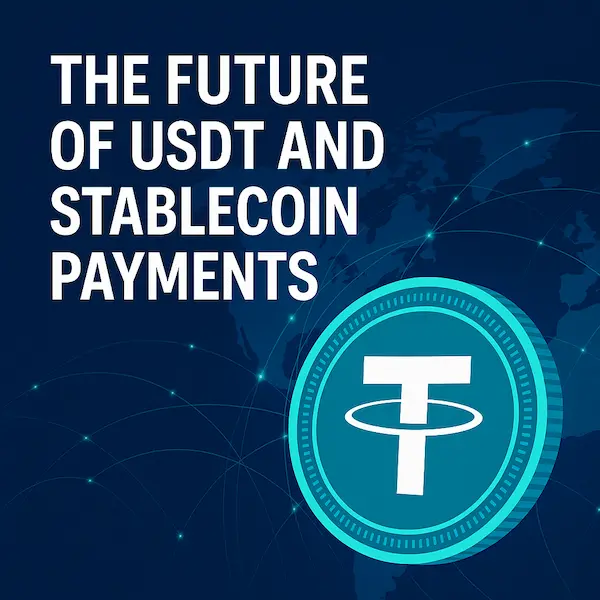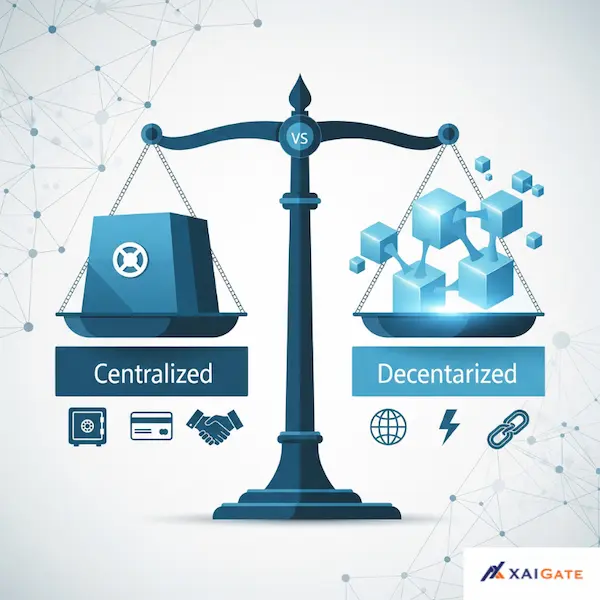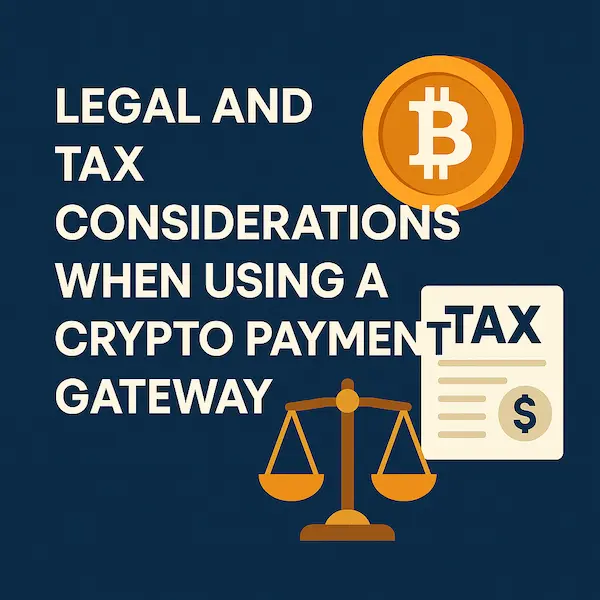As Singapore continues to solidify its position as a forward-thinking hub for blockchain and digital asset innovation, the question of how cryptocurrencies are taxed becomes increasingly critical. Whether you’re running an eCommerce store, managing a tech startup, or exploring decentralized finance (DeFi), understanding the crypto taxation landscape in Singapore is not optional—it’s essential.
In this comprehensive guide, we break down the current crypto tax rules in Singapore, explore how they may evolve in the coming years, and provide actionable advice for merchants seeking to stay compliant.
In recent years, the Inland Revenue Authority of Singapore (IRAS) has issued guidelines clarifying how cryptocurrencies should be treated for tax purposes. This clarity has given Singapore an edge over many jurisdictions, but it also raises questions for merchants: What counts as taxable income? How should crypto payments be reported? And what might change between now and 2030?
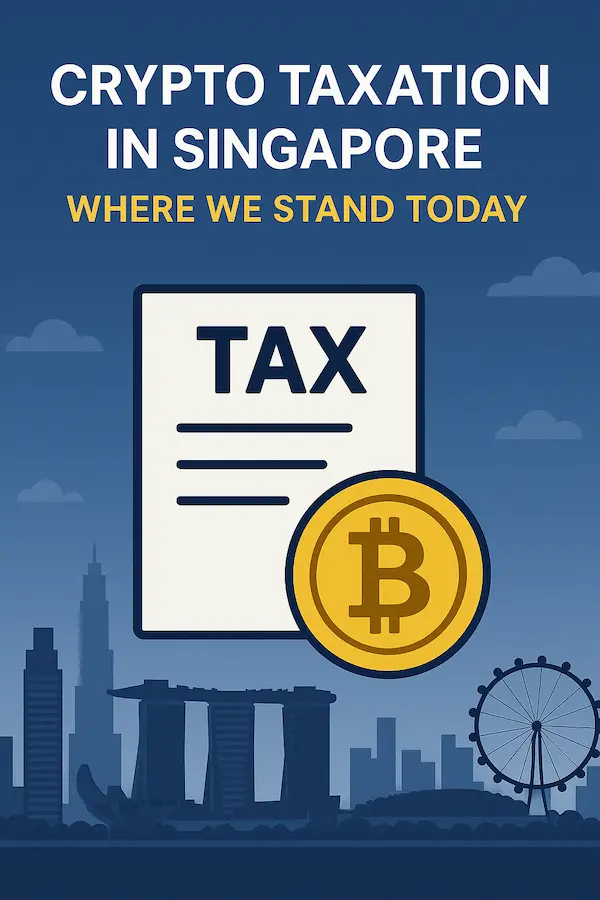
Contents
- 1 1. Crypto Taxation in Singapore: Where We Stand Today
- 2 2. Types of Crypto Transactions and Their Tax Implications
- 3 3. Tax Reporting Obligations for Businesses
- 4 4. How Crypto Taxation in Singapore May Evolve (2026–2030)
- 5 5. Tax Scenarios: Case Studies for Singapore-Based Merchants
- 6 FAQs – Crypto Taxation in Singapore
- 7 Conclusion: Preparing for the Future of Crypto Taxation in Singapore
1. Crypto Taxation in Singapore: Where We Stand Today
Singapore takes a balanced approach toward digital assets. Unlike countries that impose strict capital gains taxes, crypto taxation in Singapore focuses primarily on income tax. This means that profits derived from trading or using crypto in business activities are taxable, while long-term investment gains remain tax-free.
The IRAS guidelines highlight several important points:
-
Capital gains are not taxable: If you buy and hold Bitcoin, Ethereum, or stablecoins as a long-term investment, you are not taxed when their value increases.
-
Income from trading is taxable: If trading crypto is your regular business activity, profits are treated as taxable income.
-
Merchants must report crypto payments: When businesses accept crypto as payment for goods or services, the value of the transaction must be converted into Singapore dollars (SGD) and declared as revenue.
-
No GST on digital payment tokens: Since January 2020, GST has been removed from digital payment tokens, reflecting Singapore’s commitment to encouraging fintech innovation.
This framework makes Singapore attractive to merchants and startups. It offers predictability while allowing flexibility for businesses to innovate in crypto adoption. However, it also places responsibility on businesses to understand and comply with tax obligations — something we will explore in greater detail in the next sections.
Read IRAS’s official guidance on digital token taxation.
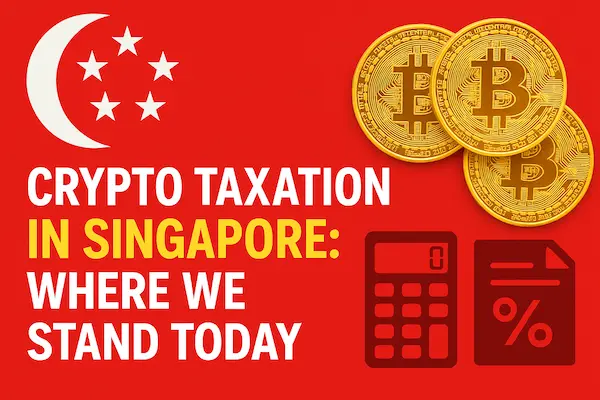
2. Types of Crypto Transactions and Their Tax Implications
Not all crypto transactions are treated the same way under crypto taxation in Singapore. The way IRAS classifies a transaction depends on its purpose, frequency, and how it is used within a business. Merchants need to understand these distinctions clearly, as tax obligations can vary significantly.
1. Receiving Crypto as Payment
If your business accepts cryptocurrency in exchange for goods or services, the value of that crypto (converted into SGD) is treated as revenue and must be declared.
2. Holding Crypto as Inventory
Some merchants choose to hold onto crypto received, either speculatively or due to operational needs. The appreciation in value is not taxed unless realized as business income (e.g., sold later in the course of business).
3. Using Crypto to Pay Suppliers
If you use crypto to pay for business expenses, the SGD value of the crypto at the time of payment is considered an allowable deduction.
4. Mining and Staking Income
Crypto received via mining or staking is generally taxed as income if done for commercial purposes. Occasional staking may not trigger tax, but regular validators and DeFi liquidity providers may be considered in trade.
5. Token Swaps and Airdrops
- Airdrops: If received as part of a marketing campaign or business activity, the SGD value should be declared as income.
- Token swaps: Taxable if there is a clear commercial intent (e.g., swapping tokens for liquidity provision).
If you’re looking for guidance on which platforms meet Singapore’s regulatory standards while offering multi-token support, automated settlement, and reliable KYC options, I highly recommend this expert guide from XAIGATE: Best Crypto Payment Gateway in Singapore
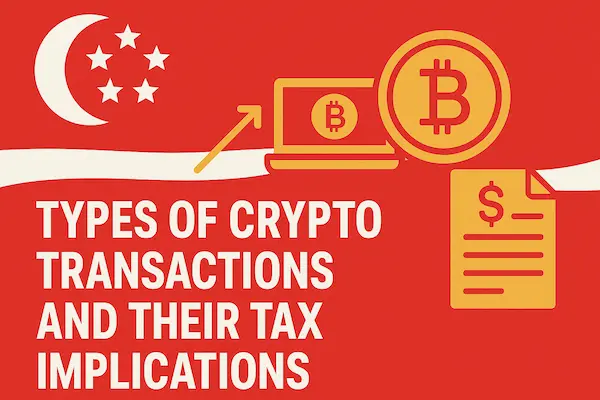
3. Tax Reporting Obligations for Businesses
For merchants and companies operating in Singapore, understanding tax reporting obligations is just as important as knowing whether a transaction is taxable. Under the framework of crypto taxation in Singapore, businesses must follow the same principles of transparency and accuracy as they would for fiat transactions.
Declaring Crypto Income to IRAS
Any revenue earned in the form of digital assets must be reported to the Inland Revenue Authority of Singapore (IRAS). This includes sales, services, or rewards received in cryptocurrencies. The value should be recorded in Singapore dollars (SGD), based on the market rate at the time of the transaction.
For example, if a merchant sells a product for 100 USDT, and the exchange rate is SGD 1.35 per USDT, the declared revenue should be SGD 135.
Record-Keeping Requirements
Businesses are required to keep detailed records of their crypto activities. This includes:
-
Transaction date and time
-
Type of digital asset used (e.g., BTC, ETH, USDT)
-
Value in SGD at the time of transaction
-
Wallet addresses of both parties (if available)
-
Purpose of the transaction (sale, service, or other)
Maintaining clear records helps prevent disputes and ensures smooth audits.
Annual Filings and Compliance
Crypto-related income must be included in annual corporate tax filings. Companies are encouraged to use accounting systems that integrate with blockchain data, or adopt specialized software such as Koinly, CoinTracking, or QuickBooks with crypto plugins.
Failure to declare income accurately may lead to penalties, interest charges, or even investigations by IRAS.
Penalties for Non-Compliance
IRAS has signaled that it will treat crypto-related reporting with the same seriousness as fiat transactions. Merchants who fail to comply may face:
-
Monetary fines
-
Back taxes with interest
-
In severe cases, legal action for tax evasion
Example: Reporting Crypto Payments in Practice
Consider an online merchant that accepts Bitcoin for digital services. Each transaction must be recorded in SGD at the prevailing market rate. Even if the merchant later converts the Bitcoin into stablecoins or holds it long-term, the initial value in SGD is what determines the taxable amount.
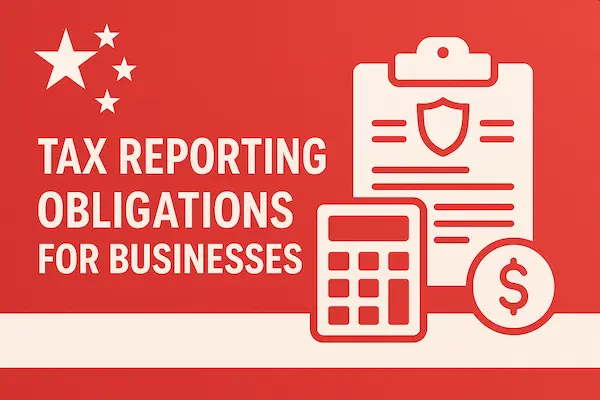
4. How Crypto Taxation in Singapore May Evolve (2026–2030)
While current policies offer clarity and stability, crypto taxation in Singapore is far from static. Over the next five years, shifts in global regulation, digital asset adoption, and technological innovation could reshape how the country approaches taxation. Merchants should anticipate changes rather than assume today’s rules will last unchanged.
Influence of Global Regulatory Standards
International frameworks such as the OECD’s Crypto-Asset Reporting Framework (CARF) and G20 recommendations are likely to push Singapore toward stricter reporting standards. As cross-border crypto transactions become more common, Singapore may adopt more robust compliance requirements to align with global best practices.
Possible Introduction of Crypto-Specific Tax Brackets
Currently, crypto income is taxed under general income tax rules. By 2030, Singapore may introduce dedicated tax brackets or categories for digital assets. This could distinguish between activities like trading, staking, and NFT sales, ensuring greater clarity for businesses and individuals.
Cross-Border Taxation and International Trade
With Singapore’s role as a regional hub, merchants often receive payments in crypto from overseas clients. A future regime may include cross-border tax treaties or reporting mechanisms to ensure that income sourced abroad but remitted to Singapore is accurately captured.
Increased Reporting Obligations for Exchanges and Merchants
Exchanges operating in Singapore might be required to provide transaction-level reporting to IRAS, similar to how banks report customer activity. This would reduce tax evasion risks and ensure transparency across the ecosystem. Merchants, in turn, could see simplified compliance if payment gateways automatically generate IRAS-ready reports.
Scenario Analysis: Two Possible Futures
-
Scenario 1 – Stricter Compliance: Higher reporting obligations, crypto-specific tax rates, mandatory integration with government reporting systems.
-
Scenario 2 – Balanced Growth: Continued low-friction environment, minimal tax changes, designed to keep Singapore competitive against jurisdictions like Dubai and Hong Kong.
Forecast Table: Current vs. 2030 Outlook
| Aspect | Current (2026) | Possible 2030 Scenario |
|---|---|---|
| Capital Gains | Not taxed | Likely unchanged |
| Income from Trading | Taxable under income tax | May have crypto-specific tax brackets |
| Staking/Yield Farming | Treated as taxable income | Stricter reporting requirements |
| Merchant Payments | Reported in SGD at time of transaction | Automated reporting via payment gateways |
| Exchange Obligations | General compliance with MAS regulations | Detailed reporting to IRAS, OECD alignment |
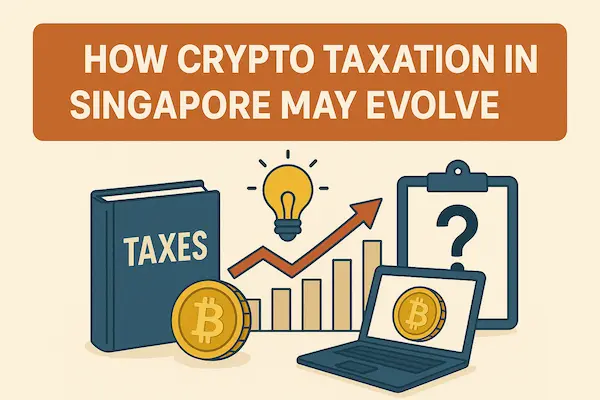
5. Tax Scenarios: Case Studies for Singapore-Based Merchants
One of the best ways to understand crypto taxation in Singapore is to look at real-world scenarios. Case studies highlight how different types of businesses may be affected, and what merchants should do to stay compliant with IRAS requirements.
Case 1: Retail Shop Accepting Stablecoins (USDT/USDC)
A small retail shop in Orchard Road allows customers to pay in USDT. Each transaction is converted into Singapore dollars at the prevailing exchange rate. For example, if a customer pays 50 USDT and the rate is SGD 1.35, the merchant must record SGD 67.50 as taxable revenue.
-
Tax treatment: The payment is treated as income, just like a credit card transaction.
-
Lesson: Merchants should use crypto payment gateways that automatically calculate SGD values for easier reporting.
Case 2: Online Service Platform Receiving Global Crypto Payments
A Singapore-based SaaS company sells digital services to international clients. Payments are often received in Bitcoin or Ethereum.
-
Tax treatment: All payments are taxable income, reported in SGD at the time of receipt. Even if the company holds the crypto for months before conversion, the taxable amount is based on the exchange rate on the day of payment.
-
Lesson: Transparent invoicing and record-keeping are critical to avoid discrepancies during audits.
Case 3: Merchant Earning from Staking Rewards
A digital marketing agency invests idle funds into staking Ethereum to generate additional income. Each month, staking rewards are deposited into its wallet.
-
Tax treatment: Staking rewards are considered income and must be declared as part of the company’s taxable revenue.
-
Lesson: Businesses must treat staking like interest income and include it in their financial statements.
Case 4: NFT Artist Selling to Collectors
An independent artist in Singapore creates NFTs and sells them online.
-
Tax treatment: Because the sale of NFTs is part of the artist’s business, income from these sales is taxable. However, if a private individual casually sells an NFT from their collection, the gain may not be taxed.
-
Lesson: The distinction between business and personal activity is key under crypto taxation in Singapore.
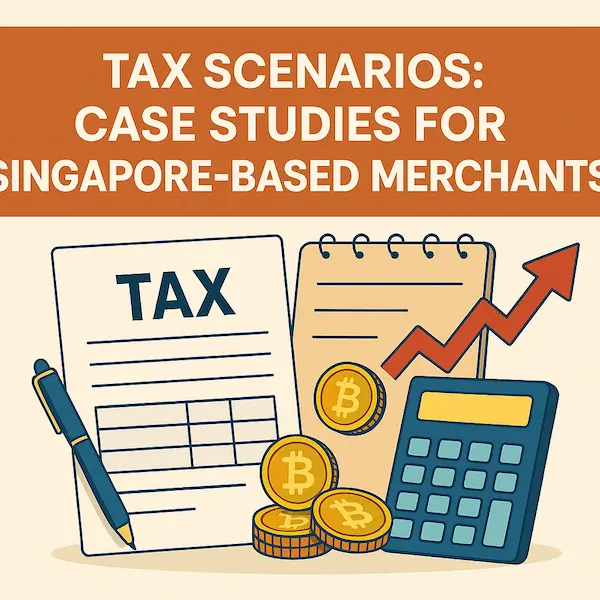
FAQs – Crypto Taxation in Singapore
1. Is cryptocurrency taxable in Singapore?
Yes. Under crypto taxation in Singapore, capital gains are not taxed, but income from trading, business use, or crypto rewards must be reported as taxable income.
2. How does IRAS classify crypto income vs. capital gains?
If you trade or use crypto as part of business activity, profits are considered taxable income. If you simply hold crypto as a long-term investment, any gains are treated as capital in nature and are not taxed.
3. Do I need to pay tax if my business accepts crypto payments?
Yes. Merchants accepting payments in Bitcoin, USDT, or other tokens must declare the value of those payments in Singapore dollars (SGD) at the time of transaction as part of their taxable revenue.
4. Are staking and yield farming rewards taxable in Singapore?
Yes. Rewards from staking or yield farming are treated as income when they are regular and business-related. Companies must include them in annual tax filings.
5. How should merchants report crypto transactions to IRAS?
Merchants should keep detailed records including date, transaction value in SGD, type of crypto, and purpose of the transaction. This ensures accurate reporting in annual filings.
6. Is GST applicable to crypto transactions?
No. Since January 2020, digital payment tokens have been exempted from GST in Singapore, making it easier for merchants to adopt crypto without double taxation.
7. What happens if I don’t declare crypto income?
Failing to declare taxable crypto income can lead to penalties, interest charges, or legal action by IRAS. Transparency is essential under crypto taxation in Singapore.
8. Will Singapore introduce stricter crypto tax rules by 2030?
Possibly. With global frameworks like the OECD’s CARF, Singapore may introduce tighter reporting requirements for exchanges and merchants, while still aiming to maintain its pro-innovation stance.
9. How do foreign crypto transactions affect Singapore taxes?
Income from overseas clients paid in crypto is taxable if it is connected to a Singapore-based business. Merchants must declare this income in SGD when reporting to IRAS.
10. What tools can merchants use for crypto tax compliance?
Popular solutions include Koinly, CoinTracking, and payment gateways like XaiGate that automatically generate reports compatible with IRAS requirements.
Conclusion: Preparing for the Future of Crypto Taxation in Singapore
The regulatory landscape around digital assets is evolving quickly, and crypto taxation in Singapore will remain a central topic for merchants in the years ahead. Current rules offer clarity — capital gains are not taxed, while business-related crypto income must be reported — but future changes are inevitable as global standards mature.
For businesses, the best strategy is proactive compliance:
-
Stay updated with IRAS guidelines: Policies are regularly updated to reflect new types of crypto activity such as staking, NFTs, or yield farming.
-
Invest in reporting tools: Payment gateways and blockchain accounting systems can automate transaction tracking, saving time and reducing errors.
-
Differentiate personal vs. business use: This distinction often determines whether an activity is taxable. Merchants should document their intentions clearly.
-
Anticipate future trends: Singapore may introduce stricter reporting obligations by 2030, in line with OECD and G20 frameworks. Preparing early gives merchants a competitive edge.
Quick Summary Table: Current vs. Future Outlook
| Aspect | Today (2026) | Outlook to 2030 |
|---|---|---|
| Capital Gains | Not taxed | Unlikely to change |
| Crypto Income (trading, staking) | Taxable as business income | Possible new tax brackets for crypto income |
| Merchant Payments | Must be declared in SGD at transaction time | Likely automated reporting via payment systems |
| Reporting Obligations | Annual filings with detailed records | Stricter, aligned with OECD CARF standards |
| Global Alignment | Limited to Singapore law | Greater harmonization with international tax |
Final Thoughts
Merchants who view compliance not as a burden but as a strategic advantage will benefit the most. Clear reporting builds trust with regulators, customers, and investors alike. Moreover, Singapore’s stance as a global fintech hub means businesses that align with tax policies will be positioned to attract international partners.
If your company is preparing to accept or expand crypto payments, now is the time to put strong compliance systems in place. By doing so, you’ll not only meet today’s requirements but also stay ahead of tomorrow’s regulatory curve.
To simplify reporting and ensure compliance, merchants can partner with trusted crypto payment gateways like XaiGate, which offer built-in reporting features tailored for IRAS standards.
For detailed guidance on integrating compliant payment solutions, visit XAIGATE’s guide on cryptocurrency payment gateways in Singapore.
For daily updates, subscribe to XAIGATE’s blog!
We may also be found on GitHub, and X (@mxaigate)! Follow us!



